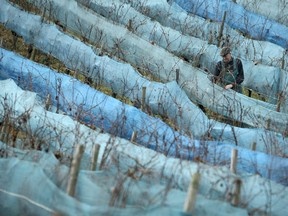For the first time in years, warm temperatures prevent Germany from producing ice wine
Ice wine is a very sweet, expensive, and rare wine made from grapes left to freeze on the vine

Article content
Due to a warm winter, German wine producers won’t be able to make ice wine for the first time in years.
On Sunday The German Wine Institute said that temperatures in the country’s wine regions had not lowered to the required -7 C, according to reporting from The Guardian and Associated Press.
Ice wine production in Germany has taken a hit in recent years due to warmer weather. Only five producers were able to make the wine in 2013, and only seven producers in 2017.
Ernst Büscher is a spokesman for the institute. He says that if this pattern continues, ice wine will become more expensive and rare.
“If warm winters become more frequent over the coming years, ice wines from Germany’s regions will soon become an even more expensive rarity than they already are,” Büscher, said.

Ice wine is made from grapes left to freeze on the vine, and vineyard owners run the risk of grapes set aside for the wine rotting before the temperature falls far enough. The frozen grapes are then pressed. Freezing the grapes before pressing them concentrates the sugar and results in a very sweet wine.
Ice wine, called eiswein in Germany, is an expensive product, as only it is made from around 0.1 percent of the total wine harvest.
According to the institute, the major markets for German ice wine include Japan, China, Scandinavia and the US.
Ice wine is also produced in the Niagara region of Canada. The Niagara Icewine Festival took place from Jan. 10 to Jan. 26.
Our website is the place for the latest breaking news, exclusive scoops, longreads and provocative commentary. Please bookmark nationalpost.com and sign up for our daily newsletter, Posted, here.






Postmedia is committed to maintaining a lively but civil forum for discussion. Please keep comments relevant and respectful. Comments may take up to an hour to appear on the site. You will receive an email if there is a reply to your comment, an update to a thread you follow or if a user you follow comments. Visit our Community Guidelines for more information.